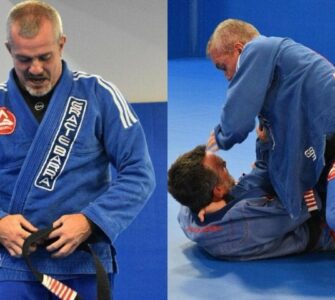Photo by Daria Kochetkova Photography. IG: Tebezvonu.
As with so many other pursuits, the more knowledge one acquires in BJJ, the more it strengthens your expertise in the “gentle art.” However, if you find yourself in the position of giving out advice, it’s important to know which situations are appropriate to enter. It’s also equally important to know how to handle unsolicited advice with minimum stress.
As a white belt, you most likely shouldn’t be giving out any advice. This isn’t to say a white belt can’t help their training partners out, but consider the fact that since you are just beginning, it’s your job to focus more on acquiring an understanding of the basic concepts, and foundational techniques to become a successful BJJ student. White belts should always be asking lots of questions. And they should also be asking for help too, so it’s a little bit out of place for them to be in a position where they are giving out advice. Not to say all white belts have bad technique, but it’s still raw, and their level of skill and has only just begun to develop. For these reasons, they risk giving out the wrong advice on how to execute a particular move to their partner. This could result in both students doing something the wrong way, and contributing to bad habits. The best thing a white belt can do is to ask their fellow higher belts, or instructors, for advice on completing a technique. Regardless of belt rank, one should always be certain and well informed before giving out instruction.
Few people enjoy criticism, but if anyone should be heavily criticizing your technique, it should be your instructor. It’s best to refrain from telling your partner what they’re doing wrong, and leave it up to them to approach you with questions. Many times, certain BJJ students love to view their training as problem solving, so they might want to repeat something over and over again until they can figure it out on their own. If you’re a spider guard expert, and you notice your training partner doing the move wrong, it’s best to ask them if they would like some help to strengthen their guard, rather than to criticize what they’ve been doing. When approaching someone with advice, it’s always good to ask if they would be open to listening first, and then to articulate it in a non-condescending manner. Compliment your partner on something, and then gently offer tips on how to improve their game.
There are proper ways of dealing with unsolicited advice, that do not have to cause friction. Know when someone is really trying to help you improve on something, or if they have some sort of dominant, judgemental intentions. It’s important to listen to what the person has to say, even if you don’t agree or find the information useless. You need to pay them the respect for reaching out to you. To begin, it’s always nice to have a warm smile, and politely say, “Thank you. I’ll take that into consideration.” This is a great way of acknowledging someone’s thoughts, yet curving the conversation towards a new topic. If you continue to receive unsolicited advice, set some boundaries and be firm with your partner. Your responses can include, “Thank you for your help, but at the moment I have a different way of handling this.” Or you might say:“Different things work for different people, so this is the way I found that works.” Limit your contact with that person if they begin to constantly nag you. If that fails, speak with your coach.

















